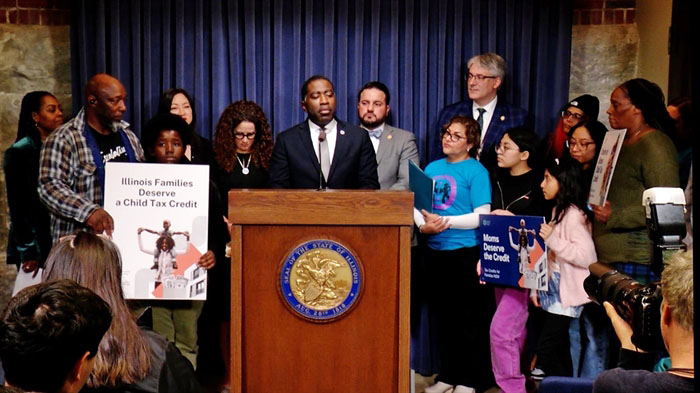
Insurance coverage for fertility treatments, child internet regulations also introduced
By Andrew Adams
Cole Longcor
& Alex Abbeduto
Capitol News Illinois
news@capitolnewsillinois.com
After failing to pass a child tax credit last year, advocates returned to Springfield Wednesday to propose a scaled back version of the policy which they say would still reduce child poverty and spur economic growth.
The proposal, contained in House Bill 4917 and Senate Bill 3329, would create a $300 per-child refundable tax credit for families who earn less than the state’s median income – about $75,000 per year for couples and $50,000 for single parents.
The policy would cost the state about $300 million, according to Erion Malasi, Illinois policy director for the Economic Security Project, an advocacy group backing the proposal.
A January report from the Illinois Economic Policy Institute, a union-backed think tank, found that a $300 tax credit would cost the state about $471 million, although that estimate doesn’t account for cost reductions in other state programs, like the earned income tax credit or the supplemental nutrition program for women, infants and children, known as WIC – and it assumes that 100 percent of eligible families will claim the credit.
Frank Manzo, an economist with ILEPI and co-author of that report, said a $300 per-child credit would be lower than in the other 15 states that have similar policies. Utah, Minnesota and Oregon – which enacted a similar credit last year – all offer $1,000 or more in credits.
“But it does comport with some budgetary realities in the state of Illinois,” he told Capitol News Illinois on Wednesday.
In December, Gov. JB Pritzker urged a “careful” approach to next year’s budget after his budget office projected a $891 million deficit.
Omar Aquino, the chief Senate sponsor of the proposal, said Wednesday he hopes the program, if passed, can be scaled up in the future.
The bills, which were introduced Wednesday, await substantive committee assignments, a necessary step before they can be voted on by the full legislature.
Manufacturers’ agenda
Tax credits were also included in a wide-ranging legislative agenda put forth by the Illinois Manufacturers’ Association.
House Bill 4670 creates a pilot program to allow manufacturers to create onsite child care programs and provide tax credits to those who do.
“We know that the lack of available child care is a hindrance to getting and keeping people, especially women, in the workforce,” sponsor Rep. Amy Elik, R-Godfrey, said.
The IMA reaffirmed support for three bills filed last spring, including two tax credits – one sponsored by Democrats, the other by Republicans. The IMA did not provide cost estimates for the tax credits.
Sen. Meg Loughran Cappel, D-Shorewood, filed Senate Bill 1313 to create a tax credit for businesses that assist their employees in repaying student loans.
“Student debt is a huge issue. This proposal would allow an employer to help offset about five thousand dollars per year,” IMA President and CEO Mark Denzler said. “It’s a great opportunity to help those individuals struggling with college debt while also making sure we have a great workforce.”
Sen. Donald DeWitte, R-St. Charles, filed Senate Bill 163 would make a temporary research and development tax credit permanent, rather than expiring every five years. The current credit will expire in 2027.
House Bill 3307 would amend graduation requirements for students entering high school in 2028, allowing them to fill the requirement of two foreign language courses with career-focused courses.
Fertility treatments
Members of the state Senate Democratic Caucus introduced three bills Wednesday aimed at increasing access to infertility treatments and fertility preservation.
If passed, the bills would require insurance companies to cover the diagnosis and treatment of infertility, certain prescription medications, and preservation of reproductive cells by amending the Illinois Insurance Code.
Senate Bill 2572 would require insurance coverage of procedures used to diagnose and treat infertility, as well as injectable medications used to treat prediabetes, gestational diabetes and obesity – all of which can make it harder to conceive and carry a baby to term.
Senate Bill 2623 would require insurers to cover the freezing of an individual’s reproductive cells without restriction or exclusion.
Another measure, Senate Bill 2639, would prevent insurance companies from denying infertility treatment coverage when recommended by a physician.
Safe screens initiative
Another pair of bills introduced this week aim to create a safer online environment for children.
Sen. Sue Rezin’s, R-Morris, proposals mostly affect children’s data and privacy and how content is moderated.
The amended Age-Appropriate Design Code Act is a privacy law based on a similar one in California that Rezin said will help parents set stronger privacy settings and change how companies use children’s data, which she said can facilitate the development of addicting content.
Senate Bill 3355 would require social media companies to have a customer service line where concerned users can report inappropriate content that would need to be removed within 3 days.
Rezin said a third bill, which is still in development, would “require social media platforms to create an identity verification process.”
The senator compared social media to the tobacco and opiate industries, saying people cannot trust them to regulate themselves. She also said Illinoisans cannot wait for the federal government to take action.
“Parents are mad,” Rezin said. “They want us to act and pass legislation to protect their children. They don’t care if it’s a federal issue or a state issue.”
Capitol News Illinois is a nonprofit, nonpartisan news service covering state government. It is distributed to hundreds of print and broadcast outlets statewide. It is funded primarily by the Illinois Press Foundation and the Robert R. McCormick Foundation, along with major contributions from the Illinois Broadcasters Foundation and Southern Illinois Editorial Association.

